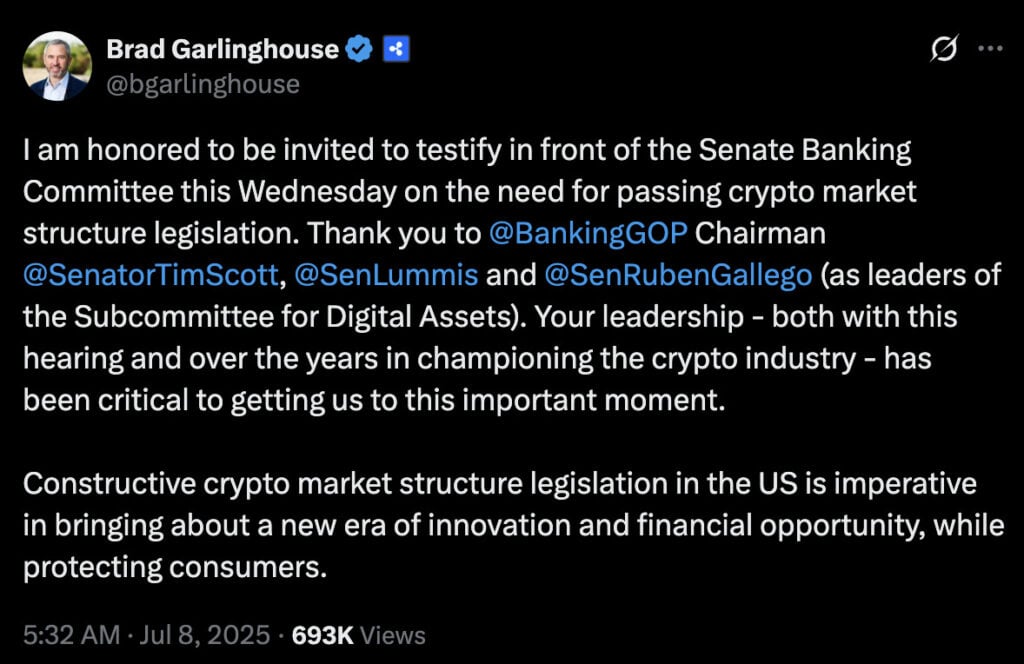Washington Braces for Crypto Week: Stablecoin Showdown & Market Structure Bill Take Center Stage
D.C.'s marble corridors echo with crypto chatter as lawmakers gear up for a pivotal week. Two seismic events could reshape the digital asset landscape—and Wall Street's watching.
The Stablecoin Endgame
Regulators are finally putting skin in the game with a long-awaited vote. Will the 'digital dollar pegs' get Washington's stamp of approval—or face another bureaucratic delay?
Market Structure Wars
The bill that could make or break crypto's regulatory future hits the spotlight. Traders whisper about potential loopholes—bankers quietly draft lobbying checks.
As the Beltway circus unfolds, one truth emerges: when politicians and DeFi collide, the only guaranteed winners are the steakhouse lobbyists. Place your bets.

At the center of the action is the Guiding and Establishing National Innovation for U.S. Stablecoins (GENIUS) Act, a Senate-passed bill to regulate stablecoin issuers like Tether and Circle, which is now barreling toward a House vote under direct pressure from President Donald Trump. If passed, it would become the first meaningful federal law governing digital assets and a key pillar of Trump’s promised “crypto summer.”
Instead of reconciling the GENIUS Act with its own stablecoin proposal, the Stablecoin Transparency and Accountability for a Better Ledger Economy (STABLE) Act, the House appears poised to capitulate, fast-tracking the Senate bill as-is. According to a source familiar with the strategy, TRUMP has made it clear: sign off on GENIUS and move on.
This sets the stage for Trump to notch another legislative win after his budget passed last week. More importantly, it clears the decks for lawmakers to focus on the Digital Asset Market Structure Clarity Act, a broader bill aimed at defining how the rest of the U.S. crypto markets should be regulated. That legislation will take center stage in a Senate hearing this Wednesday, as Congress tries to tackle the bigger beast: the sprawling and largely unregulated crypto economy.
Senator Bill Hagerty, the sponsor of GENIUS, is already looking ahead. “I look forward to enacting the GENIUS Act into law,” he said in a statement, “and to working with my colleagues to MOVE the CLARITY Act through the Senate in short order.”
But the path for Clarity is messier. Senate Banking Chair Tim Scott has penciled in a September 30 deadline for market structure legislation but hasn’t committed to using the House version as a template. Meanwhile, the Senate Agriculture Committee, which shares jurisdiction over digital asset regulation thanks to the Commodity Futures Trading Commission’s role, is moving slowly. Chairman John Boozman hasn’t scheduled a hearing yet but reportedly wants the CFTC front and center.
In the House, the Clarity Act has cleared committee and is ready for a full vote. If it passes, Trump may once again urge the Senate to adopt it wholesale rather than rework it , repeating the playbook he’s using for GENIUS. But the Senate is famously stubborn, and with 60 votes required to pass most bills, bipartisan support is essential.
Democrat Pushback
While GENIUS sailed through the Senate with a comfortable 68-30 margin, the Clarity Act faces deeper skepticism , especially from Democrats. Anti crypto senators like Elizabeth Warren have long argued that crypto market structure reforms fail to adequately protect consumers and open dangerous national security loopholes. Their other concern? Trump’s personal entanglements with the crypto industry.
Critics point to the Trump family’s ties to everything from memecoins and NFTs to crypto ETFs and digital wallets, calling it a conflict of interest. Democrats are now pushing legislation to prohibit top federal officials from having financial interests in the crypto space, a clear jab at the current administration.
Trump has released several NFTs and trading card packs, Source: BNC
Yet industry voices are rallying behind Clarity. Advocacy group Stand With Crypto sent letters to every House member urging them to support the bill, arguing it will “empower developers, protect consumers, and bolster national security.” Ripple CEO Brad Garlinghouse, in testimony prepared for Wednesday’s Senate hearing, made the case bluntly: “Once market structure legislation for digital assets becomes law in the U.S., this will catalyze a new era of U.S. competitiveness.”

Garlinghouse will testify this week, Source: X
Crypto Week will also serve as a stage for Republicans to dust off one of their favorite punching bags , central bank digital currencies. The Anti-CBDC Surveillance State Act, a bill that WOULD prevent the Federal Reserve from ever launching a digital dollar, is expected to resurface. Supporters argue it would prevent financial surveillance; critics say it’s a solution in search of a problem, given there’s no serious CBDC project underway in the U.S.
The GENIUS Act is likely to pass the House, completing its journey to Trump’s desk. The Clarity Act could follow soon after , at least in the House. But in the Senate, it’ll face a tougher climb. FIT21, an earlier attempt at crypto market structure reform, breezed through the House last session but never got off the ground in the Senate.
Crypto’s legislative endgame is now a race against time, internal politics, and presidential ambition. If Trump manages to push both the stablecoin and market structure bills over the finish line this summer, it would mark a dramatic pivot in U.S. financial policy , and cement his status as crypto’s most powerful political champion.
If not, Crypto Week may turn into Crypto Weak. But if all goes as it should, it could turn out that this is a good time to buy Bitcoin and crypto as the regulatory clarity needed finally comes into view. The Bitcoin price today hit $111,907 before pulling back slightly. Bitcoin looks finally ready to move into price discovery and new Bitcoin all time highs. If you’ve been waiting for the right time to buy Bitcoin, the time is now.

Bitcoin hit $11,900 before pulling back. Source: BNC Bitcoin Liquid Index

